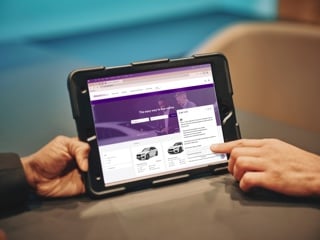It’s no secret that car sales are increasingly influenced by technology, with digital tools and services now forming a central part of the customer journey.
Its growing prominence has been spurred on by the recognition that premium quality customer service is a central part of an automotive brand’s identity.
Research from Deloitte has revealed that 62 per cent of businesses in the sector see providing outstanding customer experiences as a crucial competitive differentiator.
New smart technologies, such as artificial intelligence (AI) and automation, are set to take this a step further and transform how businesses provide customer services to drivers.
Crucially, they will present an opportunity for brands to solve one of their key challenges when it comes to customer experience – the loss of engagement following a sale.
Timely communications
Often the purchase of a vehicle ends a driver’s interaction with a brand, beyond the standard aftercare services.
A key application of these technologies will provide is what we call a ‘single view of the customer’.
Through automation, data can be continually collated from every customer touchpoint and integrated into one unified customer relationship management (CRM) system, which will enable agents working in a brand’s contact centre or employees on dealership forecourts to access a spectrum of information about a customer, from their buying intentions to previous enquiries.
This will empower them to provide consistent and seamless experiences, regardless of which channel the customer makes contact through.
Further to this, AI can be integrated into the system to generate ‘next best actions’ using predictive analytics, empowering those employees to proactively contact customers with tailored and relevant offers.
For example, if a customer is reaching the end of their finance agreement, these tools will be able to generate a selection of new deals that agents can share with customers, reducing customer effort and increasing the likelihood of another sale for the brand.
This technology will therefore fundamentally change the interaction from reactive (which is often perceived as negative) to proactive positive engagement.
While this represents a new approach for automotive businesses, we’re already seeing it change the way retail and banking businesses operate, where customers are used to this type of bespoke, proactive communication.
If automotive brands can harness this technology, it is an opportunity to transform the brand experience and provide customers with personalised, seamless experiences.
Working hand-in-hand with AI
Clearly, this technology will change the face of employment in the sector and in some cases will replace administrative tasks currently handled by people. Yet, fears that it will result in mass redundancies are often overstated. Reports are released almost weekly detailing the potential extent of job losses – a recent study by the Office for National Statistics forecast that 1.5 million people in England are at high risk of losing their jobs to automation. But in customer service, we see people and technology working side-by-side.
As more automotive businesses recognise the importance of improving the quality of customer service across an increasing number of channels, the human element of experience must remain at the forefront. Roles will change as more transactional work, such as simple queries and FAQs are picked-up by more self-intuitive platforms, such as chatbots integrated with AI. But people will continue to play an essential role in strategic areas such as lead generation and customer retention and to deliver the detailed, hands-on advice that many car buyers seek.
As technology becomes more sophisticated, staff in dealerships and contact centres will be supported rather than replaced by technology. The suite of digital assistants, for example, will empower employees to have higher-value and more personalised conversations with customers.
Enhancing skills
As brands capitalise on the benefits of these technologies, customer service representatives will not only need to enhance their communications and digital skills, but empathetic, problem solving capabilities. Bespoke training to enable employees to work across multiple customer service channels, manage complex CRM systems and handle more sophisticated enquiries will be key. While this will require investment, it should be outweighed by gains in productivity.
Instead of viewing AI and automation as a potential threat, harnessing their potential will drive greater value for brands and dealerships alike as they benefit from enhanced customer satisfaction and loyalty. It will require careful planning and training, but creating an environment where the services people deliver can be enhanced by technology will help to create a more personalised, seamless and fulfilling service for customers. In turn, there is strong potential to improve customer retention, boost conversion rates and, ultimately, increase sales.
Author: David Morton, sales and solutions director at Arvato CRM Solutions UK


















Login to comment
Comments
No comments have been made yet.